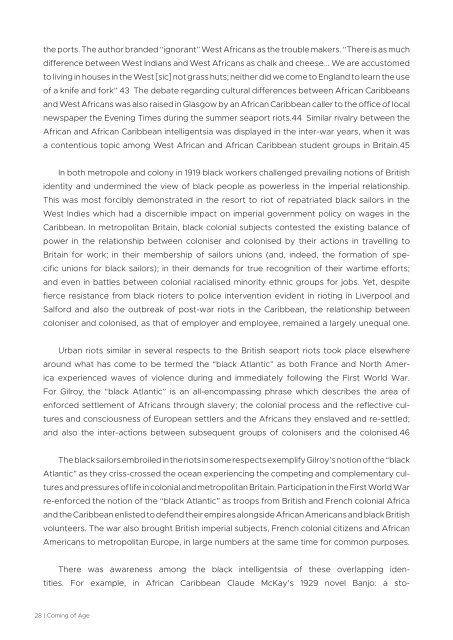Coming of Age : 1976 and the Road to Anti-Racism
Coming of Age : 1976 and the Road to Anti-Racism by Jagdish Patel and Suresh Grover
Coming of Age : 1976 and the Road to Anti-Racism
by Jagdish Patel and Suresh Grover
Create successful ePaper yourself
Turn your PDF publications into a flip-book with our unique Google optimized e-Paper software.
<strong>the</strong> ports. The author br<strong>and</strong>ed “ignorant” West Africans as <strong>the</strong> trouble makers. “There is as much<br />
difference between West Indians <strong>and</strong> West Africans as chalk <strong>and</strong> cheese... We are accus<strong>to</strong>med<br />
<strong>to</strong> living in houses in <strong>the</strong> West [sic] not grass huts; nei<strong>the</strong>r did we come <strong>to</strong> Engl<strong>and</strong> <strong>to</strong> learn <strong>the</strong> use<br />
<strong>of</strong> a knife <strong>and</strong> fork” 43 The debate regarding cultural differences between African Caribbeans<br />
<strong>and</strong> West Africans was also raised in Glasgow by an African Caribbean caller <strong>to</strong> <strong>the</strong> <strong>of</strong>fice <strong>of</strong> local<br />
newspaper <strong>the</strong> Evening Times during <strong>the</strong> summer seaport riots.44 Similar rivalry between <strong>the</strong><br />
African <strong>and</strong> African Caribbean intelligentsia was displayed in <strong>the</strong> inter-war years, when it was<br />
a contentious <strong>to</strong>pic among West African <strong>and</strong> African Caribbean student groups in Britain.45<br />
In both metropole <strong>and</strong> colony in 1919 black workers challenged prevailing notions <strong>of</strong> British<br />
identity <strong>and</strong> undermined <strong>the</strong> view <strong>of</strong> black people as powerless in <strong>the</strong> imperial relationship.<br />
This was most forcibly demonstrated in <strong>the</strong> resort <strong>to</strong> riot <strong>of</strong> repatriated black sailors in <strong>the</strong><br />
West Indies which had a discernible impact on imperial government policy on wages in <strong>the</strong><br />
Caribbean. In metropolitan Britain, black colonial subjects contested <strong>the</strong> existing balance <strong>of</strong><br />
power in <strong>the</strong> relationship between coloniser <strong>and</strong> colonised by <strong>the</strong>ir actions in travelling <strong>to</strong><br />
Britain for work; in <strong>the</strong>ir membership <strong>of</strong> sailors unions (<strong>and</strong>, indeed, <strong>the</strong> formation <strong>of</strong> specific<br />
unions for black sailors); in <strong>the</strong>ir dem<strong>and</strong>s for true recognition <strong>of</strong> <strong>the</strong>ir wartime efforts;<br />
<strong>and</strong> even in battles between colonial racialised minority ethnic groups for jobs. Yet, despite<br />
fierce resistance from black rioters <strong>to</strong> police intervention evident in rioting in Liverpool <strong>and</strong><br />
Salford <strong>and</strong> also <strong>the</strong> outbreak <strong>of</strong> post-war riots in <strong>the</strong> Caribbean, <strong>the</strong> relationship between<br />
coloniser <strong>and</strong> colonised, as that <strong>of</strong> employer <strong>and</strong> employee, remained a largely unequal one.<br />
Urban riots similar in several respects <strong>to</strong> <strong>the</strong> British seaport riots <strong>to</strong>ok place elsewhere<br />
around what has come <strong>to</strong> be termed <strong>the</strong> “black Atlantic” as both France <strong>and</strong> North America<br />
experienced waves <strong>of</strong> violence during <strong>and</strong> immediately following <strong>the</strong> First World War.<br />
For Gilroy, <strong>the</strong> “black Atlantic” is an all-encompassing phrase which describes <strong>the</strong> area <strong>of</strong><br />
enforced settlement <strong>of</strong> Africans through slavery; <strong>the</strong> colonial process <strong>and</strong> <strong>the</strong> reflective cultures<br />
<strong>and</strong> consciousness <strong>of</strong> European settlers <strong>and</strong> <strong>the</strong> Africans <strong>the</strong>y enslaved <strong>and</strong> re-settled;<br />
<strong>and</strong> also <strong>the</strong> inter-actions between subsequent groups <strong>of</strong> colonisers <strong>and</strong> <strong>the</strong> colonised.46<br />
The black sailors embroiled in <strong>the</strong> riots in some respects exemplify Gilroy’s notion <strong>of</strong> <strong>the</strong> “black<br />
Atlantic” as <strong>the</strong>y criss-crossed <strong>the</strong> ocean experiencing <strong>the</strong> competing <strong>and</strong> complementary cultures<br />
<strong>and</strong> pressures <strong>of</strong> life in colonial <strong>and</strong> metropolitan Britain. Participation in <strong>the</strong> First World War<br />
re-enforced <strong>the</strong> notion <strong>of</strong> <strong>the</strong> “black Atlantic” as troops from British <strong>and</strong> French colonial Africa<br />
<strong>and</strong> <strong>the</strong> Caribbean enlisted <strong>to</strong> defend <strong>the</strong>ir empires alongside African Americans <strong>and</strong> black British<br />
volunteers. The war also brought British imperial subjects, French colonial citizens <strong>and</strong> African<br />
Americans <strong>to</strong> metropolitan Europe, in large numbers at <strong>the</strong> same time for common purposes.<br />
There was awareness among <strong>the</strong> black intelligentsia <strong>of</strong> <strong>the</strong>se overlapping identities.<br />
For example, in African Caribbean Claude McKay’s 1929 novel Banjo: a s<strong>to</strong>-<br />
28 | <strong>Coming</strong> <strong>of</strong> <strong>Age</strong><br />
<strong>Coming</strong> <strong>of</strong> <strong>Age</strong> Final version 16.10.indd 28 17/10/2017 12:06







